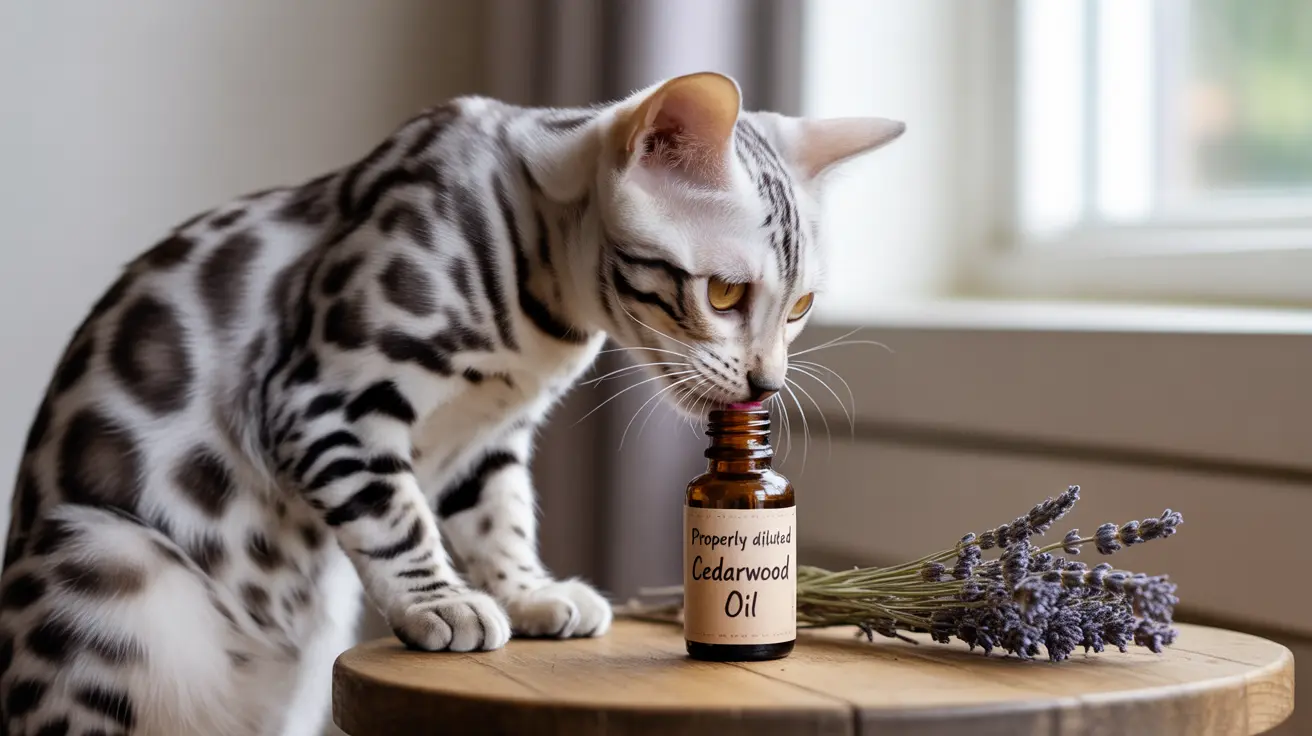Understanding Cedarwood Oil's Effect on Fleas
Cedarwood oil works through multiple mechanisms to combat fleas. The oil contains natural compounds that disrupt flea pheromones, interfering with their ability to communicate and reproduce. Additionally, these compounds can dehydrate adult fleas, eggs, and larvae upon contact when properly applied.
The strong, distinct scent of cedarwood oil serves as a natural deterrent, making treated areas inhospitable to fleas. This repellent effect can be particularly useful in preventing new flea infestations from taking hold in your home environment.
Safety Considerations for Cats
While cedarwood oil is often considered one of the safer essential oils for use around cats, several crucial precautions must be observed:
Proper Dilution is Essential
Never apply undiluted cedarwood oil directly to your cat. The oil must be properly diluted according to veterinary guidelines, typically in a carrier oil or water-based solution. Even then, it's crucial to consult with your veterinarian before beginning any treatment regimen.
Quality and Source Matter
Not all cedarwood oils are created equal. Only use oils derived from safe cedar species, particularly Juniperus ashei, and avoid products containing Western red cedar, which can be toxic to cats. Look for products specifically formulated and safety-tested for feline use.
Effective Application Methods
To safely incorporate cedarwood oil into your flea control strategy:
- Use only veterinary-approved commercial products
- Apply to environment rather than directly on your cat
- Ensure proper ventilation in treated areas
- Monitor your cat for any adverse reactions
- Maintain escape routes from treated areas
Integrating with Other Flea Control Methods
For optimal results, use cedarwood oil as part of a comprehensive flea control strategy. This might include:
- Regular vacuuming and cleaning
- Washing pet bedding frequently
- Using conventional flea preventatives as recommended by your vet
- Treating outdoor areas where fleas might proliferate
Frequently Asked Questions
Is cedarwood oil safe to use on cats for flea control?
Cedarwood oil can be safe when used properly, but should never be applied directly to cats without veterinary approval. Always use properly diluted, pet-specific formulations and monitor your cat for any adverse reactions.
How should cedarwood oil be applied around cats to repel fleas without causing harm?
The safest approach is to apply cedarwood oil products to your cat's environment rather than directly to their fur. Use it on bedding, carpets, and furniture, ensuring proper ventilation and allowing your cat to avoid treated areas if desired.
Can cedarwood oil effectively kill fleas on cats or only repel them?
While cedarwood oil has both repellent and killing properties against fleas, its primary benefit is as a repellent. For active flea infestations, veterinary-approved flea treatments are typically more effective.
What precautions should I take when using cedarwood oil products in my home to protect my cat?
Always ensure proper dilution, maintain good ventilation, keep treated areas away from feeding locations, and monitor your cat for any signs of distress. Never apply undiluted oil or use products containing additional essential oils toxic to cats.
Are there veterinary-approved cedarwood oil products specifically formulated for flea treatment on cats?
Yes, there are commercial products containing properly diluted cedarwood oil formulated specifically for flea control around cats. Always choose products with clear safety certifications and veterinary approval.
Remember, while cedarwood oil can be a valuable tool in your flea control arsenal, it works best as part of a comprehensive approach to flea management. Always prioritize your cat's safety and consult with your veterinarian before starting any new flea control regimen.






